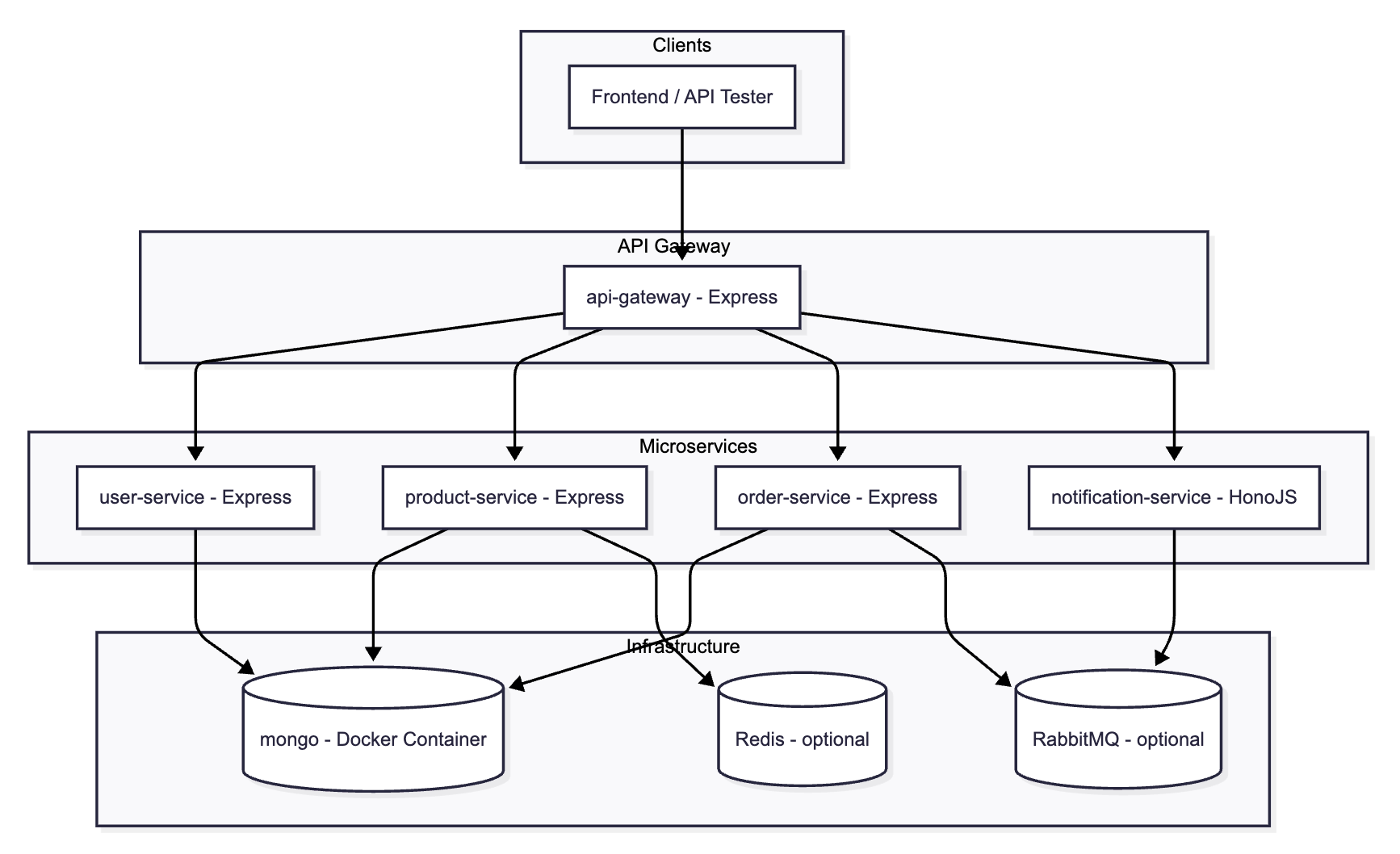Epoch 9: Dockerize All Services
In this epoch, students will containerize each microservice using Docker and connect them using Docker Compose. This will simulate a real-world deployment environment, allowing services to communicate over a virtual network and be easily started or stopped with a single command.
Objectives
- Understand how Docker works for packaging NodeJS apps.
- Create Dockerfiles for each microservice (User, Product, Order, Notification, API Gateway).
- Set up a docker-compose.yml file to orchestrate all containers.
- Enable inter-service communication using Docker Compose networking.
- Test that services work seamlessly in a containerized environment.
1. Create Dockerfiles
Create a Dockerfile in each service directory (e.g., user-service/, product-service/, etc.).
1
2
3
4
5
6
7
8
9
10
11
12
13
14
15
16
17
# Base image
FROM node:18
# Working directory
WORKDIR /app
# Copy files
COPY . .
# Install dependencies
RUN npm install
# Expose port
EXPOSE 3001 # Change this per service
# Run the service
CMD ["npm", "run", "dev"]
Make sure each service’s package.json has a “dev” script (e.g., node src/index.js or using nodemon).
2. Update docker-compose.yml
At the root of the project, create a docker-compose.yml file to define and run all services:
1
2
3
4
5
6
7
8
9
10
11
12
13
14
15
16
17
18
19
20
21
22
23
24
25
26
27
28
29
30
31
32
33
34
35
36
37
38
39
40
41
42
43
44
45
46
47
48
49
50
51
52
53
54
version: "3.9"
services:
user-service:
build: ./user-service
ports:
- "3001:3001"
environment:
- MONGO_URL=mongodb://mongo:27017/userdb
depends_on:
- mongo
product-service:
build: ./product-service
ports:
- "3002:3002"
environment:
- MONGO_URL=mongodb://mongo:27017/productdb
depends_on:
- mongo
order-service:
build: ./order-service
ports:
- "3003:3003"
environment:
- MONGO_URL=mongodb://mongo:27017/orderdb
depends_on:
- mongo
notification-service:
build: ./notification-service
ports:
- "3004:3004"
api-gateway:
build: ./api-gateway
ports:
- "3000:3000"
depends_on:
- user-service
- product-service
- order-service
- notification-service
mongo:
image: mongo:6.0
ports:
- "27017:27017"
volumes:
- mongo-data:/data/db
volumes:
mongo-data:
Note: Use environment variables like MONGO_URL inside each service’s code (.env) to match the Compose setup.
3. Update Service .env Files
Each service should have an .env like:
1
2
3
PORT=3001
MONGO_URL=mongodb://mongo:27017/userdb
JWT_SECRET=your_jwt_secret
Ensure each service listens to 0.0.0.0, not localhost, to allow Docker network access:
1
app.listen(process.env.PORT || 3001, '0.0.0.0');
4. Run All Services Together
From the project root:
1
docker-compose up --build
Use –build to rebuild images if the code changes.
To stop:
1
docker-compose down
5. Verify Everything Works
- Access API Gateway at http://localhost:3000
- Call GET /users, /products, /orders, etc.
- Check logs in each terminal or use:
1
docker-compose logs -f user-service
6. Docker Folder Structure
1
2
3
4
5
6
7
8
9
10
11
12
13
14
15
16
17
18
19
20
21
22
23
24
25
26
27
ecommerce-microservices/
├── docker-compose.yml
├── .env.example
├── user-service/
│ ├── Dockerfile
│ ├── package.json
│ ├── .env
│ └── src/
├── product-service/
│ ├── Dockerfile
│ ├── package.json
│ ├── .env
│ └── src/
├── order-service/
│ ├── Dockerfile
│ ├── package.json
│ ├── .env
│ └── src/
├── notification-service/
│ ├── Dockerfile
│ ├── package.json
│ └── src/
├── api-gateway/
│ ├── Dockerfile
│ ├── package.json
│ └── src/
└── mongo-data/ (optional volume mapping if not using Docker volume)
6.1 Each Folder Contains
| Folder | Purpose |
|---|---|
docker-compose.yml | Central file to spin up all services and MongoDB together |
user-service/ | ExpressJS API for users – has own Dockerfile & Mongo connection |
product-service/ | Product CRUD service, ready for Redis caching (Epoch 10) |
order-service/ | Handles order creation and coordination with users/products |
notification-service/ | Lightweight HonoJS logger or alert receiver |
api-gateway/ | Central routing layer for external requests |
mongo-data/ | (Optional) Persistent volume if not using Docker volume |
6.2 Sample Dockerfile Recap (for Express-based services)
1
2
3
4
5
6
FROM node:18
WORKDIR /app
COPY . .
RUN npm install
EXPOSE 3001 # Replace per service
CMD ["npm", "run", "dev"]
